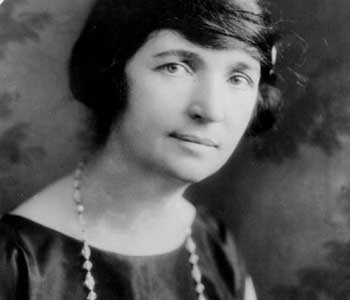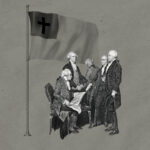This weekend Planned Parenthood celebrated its 100th anniversary, commemorating the day that Margaret Sanger, the organization’s founder, opened the first birth control clinic in America. Although Planned Parenthood has attempted to distance itself from Sanger’s more illiberal views, they still praise her role and annually give the Margaret Sanger Award—the organization’s highest honor—to “recognize leadership, excellence, and outstanding contributions to the reproductive health and rights movement.” (When Hillary Clinton won the award in 2009 she said, “I admire Margaret Sanger enormously. Her courage, her tenacity, her vision. . . . I am really in awe of her.”)
Who was Sanger? Here are nine things you should know about one of the 20th century’s most controversial figures:

1. In 1916, Sanger opened the world’s first birth control clinic in New York City. Nine days later Sanger was thrown in jail and the clinic shut down for violating the Comstock obscenity laws, which included a prohibition against literature describing contraceptive methods.
2. At the first American Birth Control Conference in 1921, Sanger founded the American Birth Control League (ABCL). In 1942 the ABCL changed its name in 1942 to Planned Parenthood Federation of America. In 1952 in Bombay, Indi,a at the Third International Conference on Planned Parenthood, the International Planned Parenthood Federation (IPPF) was founded. Sanger served as president of the IPPF from 1952 to 1959. (She died in 1966.)
3. Sanger was a leading advocate of the eugenics movement, specifically of negative eugenics, which promoted the reduction of sexual reproduction and sterilization of people with undesired traits or economic conditions. Her views on eugenics were shaped at an early age by her experience in a large family. The sixth of eleven children, she noticed as a child that the wealthy had small families while the poor had large families. In her autobiography, My Fight for Birth Control, she wrote, “I associated poverty, toil, unemployment, drunkenness, cruelty, quarreling, fighting, debts, jails with large families.”
4. Sanger believed the use of birth control was necessary, as Jyotsna Sreenivasan explains, not only for the individual woman’s well-being but also for the economy as a whole. In her 1931 pamphlet “Family Limitation,” Sanger wrote, “The working woman can use direct action by refusing to supply the market with children to be exploited, by refusing to populate the earth with slaves. . . . Pass on this information to your neighbor and comrade workers.” Sanger arranged for this pamphlet to be distributed widely though a Socialist labor union, the Industrial Workers of the World.
5. In Woman and the New Race, Sanger included a chapter to answer the question, “When Should a Woman Avoid Having Children?” Included in her list are the admonition that “No more children should be born when the parents, though healthy themselves, find that their children are physically or mentally defective” and “By all means there should be no children when either mother or father suffers from such diseases as tuberculosis, gonorrhea, syphilis, cancer, epilepsy, insanity, drunkenness, and mental disorders.”
6. On a radio show, Sanger is reported to have said that “morons, mental defectives, epileptics, illiterates, paupers, unemployables, criminals, prostitutes, and dope fiends” ought to be surgically sterilized. If they wish, she said, such people should also be able to choose a lifelong segregated existence in labor camps.
7. Sanger’s motivations about racial genocide are frequently exaggerated, misunderstood, or misconstrued. There is no doubt that Sanger believed in the supremacy of the white race and the inferiority of other racial groups (for instance, she once wrote, “It is said that the aboriginal Australian, the lowest known species of the human family, just a step higher than the chimpanzee in brain development, has so little sexual control that police authority alone prevents him from obtaining sexual satisfaction on the streets.”). But Sanger appears to have been driven more by her views on eugenics to reduce “undesirables” than by a motivation to eliminate specific racial groups. In other words, Sanger was obsessed with preventing the birth of people with physical and mental illnesses or who were economically disadvantaged, regardless of their race. Despite believing in the general racial superiority of the white race, Sanger preferred intelligent, middle class African Americans to illiterate, low class whites.
(This is not to deny, however, that Sanger’s views were implicitly—and sometimes explicitly racist—or that the effect of her ideas and organizations did not lead to the destruction of black communities. It is merely to say that it doesn’t appear racial superiority was her primary motivation for advocating sterilization and birth control.)
8. In 1939, Sanger, through the Birth Control Federation of America (BCFA), helped to initiate the Negro Project. Unlike many of her associates, she wanted the doctors involved in the project to be black in order to gain the trust of the African-American community. One infamous Sanger quote—and one frequently taken out of context—in regards to the project is,
The minister’s work is also important and also he should be trained, perhaps by the Federation as to our ideals and the goal that we hope to reach. We do not want word to go out that we want to exterminate the Negro population, and the minister is the man who can straighten out that idea if it ever occurs to any of their more rebellious members.
Some people read this statement as implying that Sanger is trying to employ ministers in an effort to hide her true motives—racial genocide. More likely, she feared that if the belief were to spread that the goal of the Negro Project was to “exterminate the Negro population” it would hinder her true eugenic objective: the extermination of the subset of the black population that she considered “degenerate.”
In this objective she was joined in the Negro project by many African-American leaders. For example, in 1939 W. E. B. Du Bois wrote in Sanger’s Birth Control Review, “the mass of ignorant Negroes still breed carelessly and disastrously, so that the increase among Negroes, even more than the increase among Whites, is from that part of the population least intelligent and fit, and least able to rear their children properly. . . [the black race] must learn that among human races and groups, as among vegetables, quality and not mere quantity really counts.”
9. Sanger remained committed to her eugenics views until her death. In a 1947 newsreel interview she said women in starving developing countries should have no more babies for 10 years. And in a 1957 television interview, Mike Wallace asked Sanger if she believed in sin. The video below shows how she answered:
You can watch the entire 30-minute interview with Wallace here.
Other articles in this series:
ESV Bible • Alzheimer’s Disease • Mother Teresa • The Opioid Epidemic • The Olympic Games • Physician-Assisted Suicide • Nuclear Weapons • China’s Cultural Revolution • Jehovah’s Witnesses • Harriet Tubman • Autism • Seventh-day Adventism • Justice Antonin Scalia (1936–2016) • Female Genital Mutilation • Orphans • Pastors • Global Persecution of Christians (2015 Edition) • Global Hunger • National Hispanic Heritage Month • Pope Francis • Refugees in America • Confederate Flag Controversy • Elisabeth Elliot • Animal Fighting • Mental Health • Prayer in the Bible • Same-sex Marriage • Genocide • Church Architecture • Auschwitz and Nazi Extermination Camps • Boko Haram • Adoption • Military Chaplains • Atheism • Intimate Partner Violence • Rabbinic Judaism • Hamas • Male Body Image Issues • Mormonism • Islam • Independence Day and the Declaration of Independence • Anglicanism • Transgenderism • Southern Baptist Convention • Surrogacy • John Calvin • The Rwandan Genocide • The Chronicles of Narnia • The Story of Noah • Fred Phelps and Westboro Baptist Church • Pimps and Sex Traffickers • Marriage in America • Black History Month • The Holocaust • Roe v. Wade • Poverty in America • Christmas • The Hobbit • Council of Trent • C.S. Lewis • Halloween and Reformation Day • Casinos and Gambling • Prison Rape • 16th Street Baptist Church Bombing • Chemical Weapons • March on Washington • Duck Dynasty • Child Brides • Human Trafficking • Scopes Monkey Trial • Social Media • Supreme Court’s Same-Sex Marriage Cases • The Bible • Human Cloning • Pornography and the Brain • Planned Parenthood • Boston Marathon Bombing • Female Body Image Issues • Islamic State
Download your free Christmas playlist by TGC editor Brett McCracken!
 It’s that time of year, when the world falls in love—with Christmas music! If you’re ready to immerse yourself in the sounds of the season, we’ve got a brand-new playlist for you. The Gospel Coalition’s free 2025 Christmas playlist is full of joyful, festive, and nostalgic songs to help you celebrate the sweetness of this sacred season.
It’s that time of year, when the world falls in love—with Christmas music! If you’re ready to immerse yourself in the sounds of the season, we’ve got a brand-new playlist for you. The Gospel Coalition’s free 2025 Christmas playlist is full of joyful, festive, and nostalgic songs to help you celebrate the sweetness of this sacred season.
The 75 songs on this playlist are all recordings from at least 20 years ago—most of them from further back in the 1950s and 1960s. Each song has been thoughtfully selected by TGC Arts & Culture Editor Brett McCracken to cultivate a fun but meaningful mix of vintage Christmas vibes.
To start listening to this free resource, simply click below to receive your link to the private playlist on Spotify or Apple Music.


































